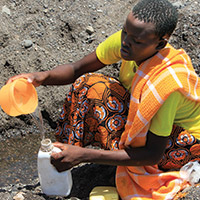How implementation science is improving health worldwide
Anemia. Weakness. Malaise. Intestinal discomfort. Interrupted cognitive and physical development.
For nearly two billion people across the planet, these symptoms are part of daily life. They’re part of living with soil-transmitted helminths — more commonly known as intestinal worms — inhabiting victims’ bellies, sapping their nutrients and stunting their physical and cognitive development.

In countries where the disease is endemic, intestinal worms have long been a public health problem and a human rights issue — and the UW School of Public Health is doing something about it. Researchers are playing a leading role in DeWorm3, a project coordinated by the Natural History Museum in London and funded by the Bill & Melinda Gates Foundation that seeks to interrupt the transmission of worms.
“Soil-transmitted helminths have a low-level, ongoing transmission cycle. We’re trying to see what happens if we actually treat the entire community — preschool-aged children to adults — and compare that to the current standard of only treating kids,” says Arianna Means (MPH '13 Epidemiology), PhD candidate and DeWorm3 research scientist.
The project, led by Associate Professor Judd Walson, seeks to leverage existing mass drug administration programs in Benin, Malawi and India currently used for another disease, lymphatic filariasis (commonly known as elephantiasis). This makes DeWorm3 one of the largest projects to date in the field known as implementation science.
“There’s a lot of drive to conduct research and publish it, but then it’s over,” Means says. “Implementation science is actually taking that next step, bridging the ‘know-do’ gap. It’s asking, ‘What does this research mean for the people suffering from these diseases? Who can benefit from interventions?’ and then doing something about it. Implementation science is research-based and scientific, but it’s also action-oriented.”
And there’s no better place to do this work than the UW, Means says. The Department of Global Health is home to the world’s first PhD program in metrics and implementation science, transforming the way people approach population health to improve lives.
On average, it takes 17 years in the U.S. to go from the discovery of an intervention to its implementation at scale, according to Kenny Sherr (MPH '00 Health Services, PhD '09 Epidemiology), associate professor of global health. On the global level, the gap is even larger. “What implementation science tries to do is to take what we know works in terms of health interventions from randomized controlled trials, or efficacy trials, and to improve the speed and quality of its implementation to have an impact on population health,” Sherr says.
According to Bryan Weiner, professor of global health and health services, implementation science includes helping domestic health care organizations figure out how to use the most innovative and effective practices to deliver preventive services and care to those most in need.
To see the full multimedia story, visit: www.washington.edu/boundless/improving-public-health
